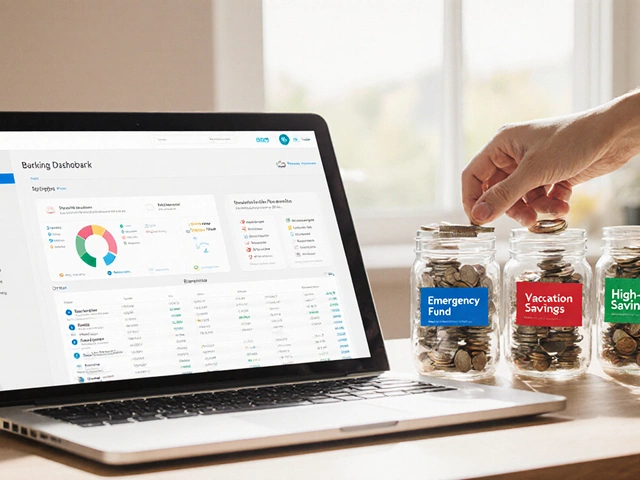
Diving into the world of GST assessment might feel a bit like stepping into uncharted waters. But once you know the ropes, it can turn into a straightforward routine. That's what this article aims to achieve—making the GST filing process less of a mystery and more of a managed task.
We'll take you through the most crucial aspects of GST assessment, from the main steps you need to follow, to tips and tricks that seasoned business folks swear by. Whether you're new to this or have been filing for years, there's always something new to learn that can ease your journey.
With clear guidance and a few helpful insights, we hope to make GST assessments a breeze, all while ensuring that you stay right on track with regulations. Now, let's get into the meat of it and see how you can master your GST filing process, one step at a time.
- Understanding GST Assessment
- Essential Steps to Prepare for GST Filing
- Common Challenges and How to Overcome Them
- Important Tips for a Smooth Filing Process
- Ensuring Compliance with Tax Regulations
- Simplifying Your GST Assessment Strategy
Understanding GST Assessment
GST, or Goods and Services Tax, represents a significant evolution in taxation, unifying myriad state and local taxes under a single regime. As straightforward as it might sound, getting to grips with GST assessment involves a solid understanding of its intricacies. Think of it as piecing together a puzzle, where each piece represents a tax component that impacts businesses in varied ways. At its core, GST assessment evaluates the tax liability of a business entity over a specific period, ensuring that each transaction meets statutory necessities and compliance benchmarks. This system ensures that the taxes collected at different points of sale are well-accounted for, aiming for transparency and straightforwardness in how taxes flow through the economy.
For businesses, the primary responsibility in a GST regime is to file periodic returns accurately. These returns should encapsulate details about sales, purchases, output tax, and input tax credit. The input tax credit is particularly crucial, as it enables businesses to reduce their tax burden by claiming a credit for the taxes paid on purchases. Getting familiar with terminologies like GSTR-1, GSTR-3B, and Annual Returns is fundamental since each serves a specific purpose in a company's tax reporting. An interesting fact is that as per recent amendments, businesses surpassing a certain revenue threshold must also comply with e-invoicing regulations, aimed at smoother digital accounting.
One valuable perspective comes from the thought leaders at Deloitte, stating,
"GST transformed the Indian taxation landscape by simplifying it; however, the onus of compliance is on businesses to avoid penalties."This highlights the essence of adhering to compliance protocols while reaping GST benefits. During assessments, the authorities cross-verify the returns filed with the actual business activities, which could lead to tax refunds or demands, depending on the outcomes. This doesn't just ensure compliance but also acts as a preventive check against tax evasion.
Notably, the government has provided user-friendly software for filing returns, which reflects the push towards a digitized and accessible tax filing process. Yet, it's essential to double-check entries to avoid discrepancies that could trigger assessments. Industries particularly involved in exports can benefit from specific reliefs, which could play a crucial role in maintaining positive cash flow. In terms of helpful data, consider the compliance easing measures introduced recently:
| Amendment | Effect |
|---|---|
| Increased threshold for e-invoicing | Benefited small and medium enterprises |
| Relaxed return filing deadlines | Reduced late fees and penalties |
These reforms not only aim to streamline the process but also enhance the business experience by minimizing bureaucratic hurdles. With each filing, businesses inch closer to mastering GST and all its nuances, and although it might seem daunting at first, understanding the reasons behind each requirement transforms it into a constructive experience. After all, staying informed is the best way to demystify the GST assessment process and transform it into a manageable aspect of running a successful business.
Essential Steps to Prepare for GST Filing
Preparing for GST filing is a task that requires attention to detail and a grasp of your business's financial standing. One of the foundational steps is to ensure that your business has implemented a strong accounting system. This system should be able to produce accurate and timely financial data, which resonates with what James Matthews, a renowned tax advisor once mentioned:
"The backbone of a successful GST filing process is accurate record keeping and consistent financial tracking."Setting up efficient accounting practices will not only help in tracking daily income and expenditure, it will also ease the burden during the hectic filing periods. An organized bookkeeping habit can mitigate errors and surprises during the assessment phase, keeping stress levels in check.
Another crucial step is to regularly audit your invoices and financial statements. Comparing your collected GST with what your business ought to remit is a practice that cannot be understated. This regular check ensures that you are not undercharging or overcharging your customers, which could lead to compliance issues down the road. By maintaining this discipline throughout the fiscal year, the end-of-year rush becomes more manageable. It’s also a great opportunity to review if any amendments need to be made before the final submission.
Keeping abreast with any changes in GST laws and regulations is equally important. These laws can shift based on governmental policies and economic strategies, affecting how you file your GST. Engaging in seminars or subscribing to tax updates can provide valuable insights that might affect your business operations. This is particularly vital for businesses operating across multiple states or nations, where compliance may differ significantly. Staying informed can save your business from penalties and ensure that your operations stay above board.
Additionally, categorically understanding input tax credit (ITC) is key. Claiming the correct amount from your purchases can have a significant impact on your cash flow and tax liability. Ensure that you have the right documentation and that all your invoices from suppliers are GST-compliant to smoothly claim ITC. This might need a systematic review and communication with your suppliers, ensuring that they are also compliant with GST regulations.
To prevent any last-minute hurdles, engage with a tax consultant or a financial advisor. These professionals bring valuable expertise to the table and can help tailor specific strategies suitable for your business. Not only do they assist with understanding the intricate parts of GST filing, but they also provide peace of mind knowing that your tax matters are in capable hands. Ultimately, their guidance can be a worthy investment, saving time and avoiding unnecessary costs or legal discrepancies.
Finally, consider employing tax filing software if you haven’t yet. These tools are designed to facilitate accurate and efficient filing processes, often reducing room for human error. Many of these packages are cloud-based, offering features like automated tax calculations, filing reminders, and real-time data access. A wise investment in such technology can ease the GST filing process manifold, allowing you to focus on growing your business instead of getting bogged down in paperwork.

Common Challenges and How to Overcome Them
One of the most common hurdles faced in the GST assessment process is the sheer volume of data that businesses must handle. Every invoice, receipt, and document needs to be meticulously collected and recorded. These details are crucial to ensuring accuracy in your GST filing, but keeping track of everything can quickly become overwhelming. To tackle this challenge, establishing a robust organized system is key. Start by digitizing receipts and using software that can help streamline data collection. This not only helps in reducing physical clutter but also in minimizing human error. Regularly updating records instead of waiting until the end of the tax period can make the process less daunting.
Another significant issue is misunderstanding the tax regulations which can lead to compliance oversights. The rules around GST are constantly evolving, and if you're not keeping up, you could inadvertently find yourself on the wrong side of the law. Making it a habit to review the regulatory updates frequently is essential. Subscribing to relevant industry newsletters or consulting with a tax advisor can offer clarity. Engaging with experts in GST regulations can help ensure adherence to the prevailing laws, and this could protect you from hefty fines.
Technological glitches can pose serious obstacles during the GST filing process. Imagine facing a server error just as you are about to submit your GST return on the deadline day. To mitigate such issues, it's advisable to complete filings well ahead of deadlines. Being proactive reduces stress and gives you ample time to address any unforeseen technical problems. Maintaining backups of critical documents in cloud storage is equally paramount. This redundancy ensures that even if something goes awry, you have quick access to all your data.
Another palpable challenge is the potential for errors in the actual calculation of GST. Mistakes can easily happen if you manually compute taxes due or refunds. Large volumes of transactions increase this risk. Emphasizing the use of robust accounting software, which is often equipped with built-in checks, can help avoid these pitfalls. These tools not only perform precise calculations but also provide reminders about deadlines and compliance requirements.
Past experiences of businesses have shown that being proactive in understanding these challenges and employing strategic solutions can significantly ease the GST assessment journey. As one entrepreneur succinctly put it,
'Understanding that compliance doesn’t rest solely on numbers but on clear, methodical processes is half the battle won.'Businesses are increasingly turning toward software solutions, and for good reason. They present modern fixes for age-old problems, helping businesses save time, reduce errors, and focus on growth opportunities.
Important Tips for a Smooth Filing Process
Handling your GST assessment efficiently isn't just about getting numbers right; it's about setting the stage for success with sound habits. One of the most pivotal tips is maintaining meticulous records. Every transaction should be documented accurately, leaving no room for error. If you're not organized, tax season can quickly become a nightmare. Habitually staying on top of receipts and invoices ensures they won't become insurmountable later when you face a looming deadline.
Using a reliable accounting software can save time and reduce errors significantly. You don't want to sift through piles of paperwork when software can simplify things for you. These tools not only automate calculations but provide insights into your financial health, which can be incredibly useful for decision-making. Automation will eliminate human error, keeping your tax assessment on point and your business compliant.
Keeping abreast with the latest rules is crucial since regulations can change, and what was applicable last year may not hold now. Subscribing to reputable tax bulletins or engaging a knowledgeable tax professional can ensure you're always in the know. As a well-known saying goes, "Prevention is better than cure." This adage definitely applies to tax compliance, where knowing ahead can save businesses from costly penalties.
"A penny saved is a penny earned," says Benjamin Franklin. It's astonishing how much can be saved by avoiding penalties through timely and informed filing.
Setting reminders for critical filing dates can mitigate the risk of missing deadlines. Missing a filing date often results in penalties that could have been easily avoided. You might want to mark them well ahead with notifications so they don't sneak up on you unexpectedly and throw plans off course. Planning allows room to address unexpected issues without the undue pressure of looming timelines.
Engage with experienced professionals who can review your documentation, ensuring everything aligns with legal requirements. This proactive move can not only catch errors you might miss but also impart strategies for better savings and risk management. Spending a little upfront for professional advice can prevent hefty expenses down the line from unforeseen errors or overlooked opportunities. Such partnerships foster a deeper understanding of the filing process, building a cushion of confidence for handling more complex assessments.
Finally, consider conducting regular internal audits to ensure ongoing compliance with tax regulations. Internal audits aren't just for finding mistakes but for discovering mechanisms to streamline processes. This practice can foster a culture of constant improvement within your business operations, setting you up for even greater success. A systematic approach to monitoring and adjusting financial processes can make your GST filing a stress-free aspect of your operations.

Ensuring Compliance with Tax Regulations
For many business owners, ensuring compliance with tax regulations can be as demanding as it is critical. At its core, the GST system is designed to streamline taxation, yet staying on the right side of compliance mandates constant vigilance and understanding. Compliance isn't just about meeting deadlines; it's about maintaining accurate records, submitting correct information, and understanding legislative changes. Businesses need to keep comprehensive documentation of all transactions since discrepancies can lead to significant penalties. Hence, keeping orderly, transparent accounts is paramount to avoid issues with audits and investigations.
Maintaining open communication with your accountant or tax advisor is one of the best ways to ensure ongoing compliance. These professionals are well-versed in the intricate details of GST assessments and can provide valuable guidance. Some businesses also find it beneficial to implement dedicated GST accounting software, which aids in accurate record-keeping and helps in generating timely reports. By doing so, you minimize human error and ensure all your calculations are in line with current tax laws, giving you peace of mind.
An insightful quote by the famed financial guru, Warren Buffett, sums it up: "Risk comes from not knowing what you're doing."
"In the world of taxes, knowledge isn't just power—it's profit saved."Staying informed about policy changes related to the GST is crucial. Legislation often evolves, and it's your responsibility to update those practices accordingly. Make sure to attend workshops, engage in webinars, and consult regularly updated resources from reputable tax authorities. You can also subscribe to newsletters from tax boards or advisory firms which specialize in the specifics of GST regulations.
Training your internal team plays a vital role in ensuring compliance as well. Employees who handle financial transactions and tax filings should be well-trained in company policies, comprehensive documentation, and the latest practices. Regularly conducting internal audits can catch any discrepancies before formal assessments. It's also wise to cultivate a compliance culture, where every level of staff understands the importance of adhering to financial guidelines.
For a quick reference to stay compliant, follow these steps: First, always report accurate sales and purchase details. Second, ensure timely filing to avoid late fees and interest. Third, reconcile your GST records periodically with bank statements to spot discrepancies early. Lastly, respond promptly to any notices from tax authorities.
Recent statistics by a global auditing firm showed that companies who routinely engaged in proactive compliance measures reported a 30% reduction in penalties related to taxation errors within their first year of implementation. Such businesses also witnessed an increase in efficiency as they spent less time mired in corrections or responding to compliance audits. The goal here is not merely to avoid penalties but to cultivate an environment of trust and legality which benefits long-term financial health. Armed with the right practices and knowledge, navigating the complex world of GST assessments becomes less daunting and more of a routine business task.
Simplifying Your GST Assessment Strategy
When it comes to GST assessment, the goal should be to make the process as simple and efficient as possible. To begin with, understanding the specific requirements for GST compliance is critical. Every business must adhere to specific guidelines and deadlines, which can vary based on the size and nature of the business. Once you're clear on these, creating a calendar with all the key filing dates is a great first step. This ensures you never miss a deadline and avoids the last-minute rush that typically leads to errors. In addition, keeping your financial records organized throughout the year can significantly cut down on stress when it comes time to file. Utilize accounting software to automate as much of the process as possible. This is where technology can be a firm ally, potentially saving hours of manual work while minimizing errors in calculations.
Another smart move is to appoint a dedicated team or individual within your organization to manage the GST filing process. This ensures accountability and establishes a clear point of contact for any questions or issues that may arise. Regular training and updates are a must for these team members so they're always on top of the latest GST regulations and changes. Communicate clearly with your team about the importance of accurate data entry and consistent record-keeping. Encouraging open dialogue around GST topics can lead to discovering new ways to streamline processes as well. In relation to this, never underestimate the value of professional advice. A good tax consultant can offer insights that may not be apparent to someone without specialized knowledge and can often identify ways to legally minimize tax liability without risking fines or penalties.
"The key to streamlined GST compliance lies in consistent record-keeping and proactive planning," once remarked an expert at a tax symposium. These words hold true across industries.
One often overlooked strategy is actively engaging in discussions on forums or groups with other business owners. Learning from the experiences and strategies of others can provide a fresh perspective on handling your GST assessments. These forums are goldmines for problem-solving tips and innovative strategies that have worked for others in similar situations. Lastly, consider documenting your GST filing process. By developing an internal guide that outlines steps and responsibilities, future filings will become progressively easier. This not only serves as a useful training tool for new employees but also as a reference for existing team members, preventing knowledge loss due to staffing changes.
A common oversight is neglecting an audit trail. Always backtrack to verify the accuracy of your GST submissions. An audit check at regular intervals ensures that inaccuracies are caught and corrected well before submission, reducing the chances of discrepancies. Moreover, analyzing past tax filings can give you insights into areas needing improvement and allow you to fine-tune your strategy.
Leveraging Technology
Using technology wisely can serve as a great force multiplier in GST assessments. Adopting comprehensive accounting software not only helps maintain accurate records but also simplifies data retrieval during assessments or audits. With advancements in artificial intelligence, some platforms can even analyze the data and offer suggestions for optimizing tax strategies, thereby ensuring you don't pay more than necessary. Investing time in selecting the right tools that fit your business requirements will pay off in the long run, scraping minutes off from otherwise tedious tasks.








Write a comment